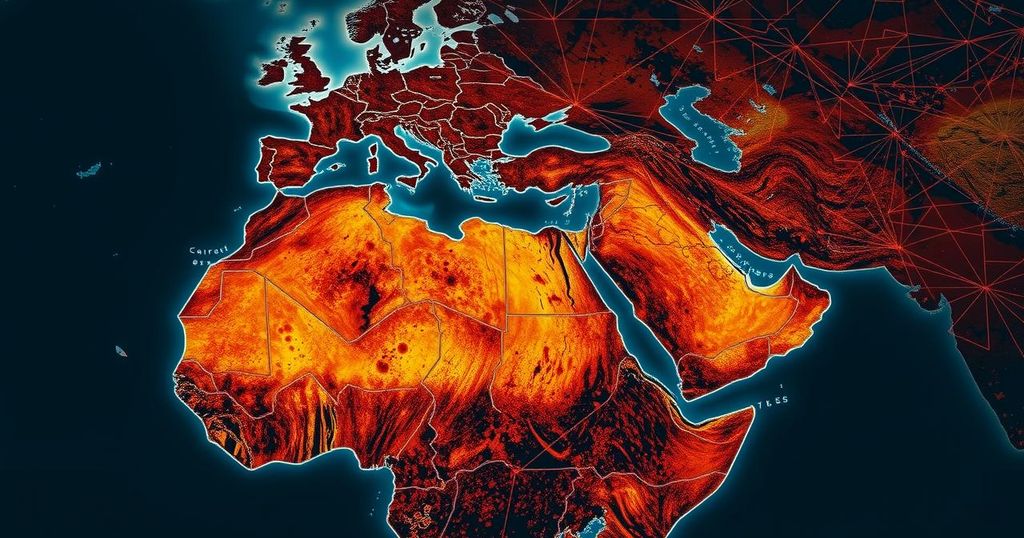A recent summit between Egypt, Eritrea, and Somalia in Asmara has indicated a notable shift in Horn of Africa geopolitics, emphasizing cooperation while ostensibly seeking to counter Ethiopia’s rising influence. The leaders discussed regional stability and autonomy but reflected underlying tensions provoked by Ethiopia’s actions, particularly regarding the Grand Ethiopian Renaissance Dam and Somaliland. This changing dynamic suggests a potential redistribution of power, while Egypt’s military involvement in Somalia highlights its intent to challenge Ethiopia’s influence. Ethiopia must enhance diplomatic efforts to mitigate security concerns and manage these evolving alliances effectively.
The recent trilateral summit held in Asmara, Eritrea, between the leaders of Egypt, Eritrea, and Somalia, indicates a significant shift in the geopolitical landscape of the Horn of Africa, a region historically marked by instability and intense rivalry. The summit was ostensibly convened to establish cooperation amidst escalating regional security challenges; however, it subtly revealed an underlying strategy aimed at containing Ethiopia, a key actor whose influence continues to spark apprehension among its neighbors. Leaders Isaias Afwerki of Eritrea, Abdel Fattah al-Sisi of Egypt, and Hassan Sheikh Mohamud of Somalia discussed enhancing regional cooperation, asserting the importance of territorial integrity and opposing foreign interference. Nevertheless, the discussions were underscored by Ethiopia’s contentious involvement in the region, particularly concerning its agreement with Somaliland and ongoing disputes with Egypt over the Grand Ethiopian Renaissance Dam, which Ethiopia views as vital for its development but which Egypt considers an existential threat to its water supply. The relationship between Somalia and Egypt has deepened following a military pact inked in August, with Egypt supplying Somalia with military resources to combat the al-Shabaab insurgency. As a result, Ethiopia’s connections with its neighbors appear to be weakening, leading to a strengthened Cairo-Mogadishu axis. The underlying tensions concerning Ethiopia’s ambitions and its potential acquisition of a Somaliland coastal region further complicate the dynamics, especially as Somalia refuses to acknowledge Somaliland’s independence. The implications of the Asmara summit are profound. Egypt’s historical tension with Ethiopia centering on water politics, specifically regarding the Grand Ethiopian Renaissance Dam, remains a critical point of contention. Cairo’s military presence in Somalia and its role in regional security highlight its strategy to mitigate Ethiopian influence, thereby reinforcing Egypt’s alliances. Eritrea’s collaboration with Egypt signifies a strategic maneuver to enhance its standing within the region, particularly given its geographic importance at the Bab el-Mandeb Strait. Somalia’s grievances regarding Ethiopia’s actions have fostered a closer alliance with Egypt, traditionally seen as its adversary. Ultimately, the alliances forming through this summit suggest a redistribution of power in the Horn of Africa. While the collaboration among Egypt, Eritrea, and Somalia could potentially stabilize the region, it equally poses the risk of heightening tensions, especially if Ethiopia perceives this alliance as a direct threat to its interests. Egypt’s involvement is particularly notable given its lack of direct borders with Somalia and Ethiopia, hinting at the potential for proxy conflicts designed to destabilize Ethiopian influence. Ethiopia’s need to engage diplomatically with its neighbors and international stakeholders cannot be overstated in the face of these shifting alliances, as they will significantly shape the political and security landscape of the Horn of Africa in the years to come.
The Horn of Africa has experienced a long history of complex geopolitical dynamics, characterized by shifting alliances and longstanding rivalries. Regional actors such as Ethiopia, Egypt, and Eritrea have competed for influence, with issues concerning water security, territorial integrity, and military cooperation at the forefront. Ethiopia’s construction of the Grand Ethiopian Renaissance Dam has exacerbated tensions with Egypt, which relies on the Nile for its water supply. Additionally, disputes over Somaliland’s status further complicate regional dynamics as Somalia grapples with unresolved territorial claims and political instability. Recent developments, including military pacts and alliances, suggest a reconfiguration of key relationships in response to these ongoing challenges.
The trilateral summit in Asmara marks a pivotal moment in the geopolitics of the Horn of Africa, as it signifies evolving alliances aimed at counterbalancing Ethiopia’s influence. The collaboration among Egypt, Eritrea, and Somalia underscores the increasing complexity of regional dynamics characterized by deep-seated historical grievances and strategic ambitions. While this new axis may foster attempts to restore stability, the potential for heightened tensions with Ethiopia looms large, necessitating proactive diplomacy and regional engagement. Ethiopia’s ability to navigate these changing relationships will be critical in determining its future security and political landscape.
Original Source: thehill.com






